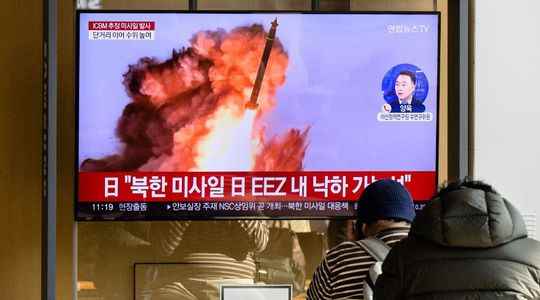North Korea launched an intercontinental ballistic missile (ICBM) on Friday, November 18, which fell off Japan, the latest episode in a record series of projectile launches in recent weeks, while Seoul, Tokyo and Washington expect an imminent nuclear test from Pyongyang. The South Korean general staff “detected an alleged long-range ballistic missile launched around 10:15 a.m. (0115 GMT) from the Sunan area in Pyongyang towards the East Sea”, he said in referring to the Korean name for the Sea of Japan.
Tokyo said the missile had traveled about 1,000 km and that Japanese forces had not attempted to destroy it in flight. Japanese Defense Minister Yasukazu Hamada said the projectile had reached a maximum altitude of 6,000 km, deducing that it was an “ICBM-class ballistic missile, although other details are being analyzed. “The ballistic missile launched by North Korea appears to have fallen into our exclusive economic zone off Hokkaido”, the large island in the north of the Japanese archipelago, said Japanese Prime Minister Fumio Kishida.
This is not the first time that a North Korean projectile has ended its course in the Japanese exclusive economic zone (EEZ), that is to say the maritime space which extends up to 200 nautical miles ( 370 km) beyond the coasts of a State, between territorial waters and international waters. North Korea “repeats acts of provocation with unprecedented frequency. We strongly reiterate that this is absolutely unacceptable”, denounced Fumio Kishida.
An emergency meeting at APEC
The White House for its part “strongly” condemned the shooting, which it said constitutes “a brazen violation of multiple United Nations Security Council resolutions and unnecessarily raises tensions and risks destabilizing the security situation in the region”. . In the process, an emergency meeting at APEC was set up between Washington and five other countries including Japan and South Korea, according to American sources. US Vice President Kamala Harris will jointly meet the leaders of Japan, South Korea, Australia, New Zealand and Canada on Friday after North Korea fired an intercontinental ballistic missile, a source said. American official.
Kamala Harris, who is attending an Asia-Pacific summit in Bangkok, will meet the five leaders on the sidelines of the summit “to consult on the recent launch of a ballistic missile by the DPRK” (North Korea, editor’s note), said the White House official. On November 3, North Korea had already launched an ICBM but that launch had apparently failed, according to Seoul and Tokyo. The country had broken last March a moratorium that it had imposed on itself in 2017 on the launches of this type of long-range missile. Earlier this week, the North Korean foreign minister promised a “fierce” response to the strengthening of the security alliance between Seoul, Tokyo and Washington.
The United States, South Korea and Japan have intensified their joint military maneuvers in recent months in the face of threats from North Korea, which sees these exercises as dress rehearsals for an invasion of its territory or an overthrow of the regime. of Kim Jong Un. During a meeting on Tuesday on the sidelines of the G20 summit in Bali, US President Joe Biden asked his Chinese counterpart Xi Jinping to intercede with North Korea to end its the escalation and renounces carrying out a nuclear test, as Washington and Seoul lend him the intention.
An unprecedented flurry of launches in November
Joe Biden, his South Korean counterpart Yoon Suk-yeol and Fumio Kishida also promised a “strong and firm” response on Sunday if Pyongyang carries out this test, which would be the first since 2017 and the seventh in its history. The head of North Korean diplomacy, Choe Son Hui, replied that the strengthening of the military alliance between Seoul, Tokyo and Washington was “entering the situation on the Korean peninsula into an unpredictable phase”.
The stronger this alliance becomes, “the fiercer the DPRK’s military response will be,” said Choe Son Hui, using the acronym of the Democratic People’s Republic of Korea, the official name of North Korea. Pyongyang carried out an unprecedented flurry of launches in early November, including a missile that fell near South Korean territorial waters for the first time since the end of the Korean War in 1953. President Yoon said denounced a “de facto territorial invasion”. November 2 alone saw 23 North Korean missile launches, more than all of 2017, when leader Kim Jong Un and then-US President Donald Trump threatened each other with a nuclear apocalypse.
